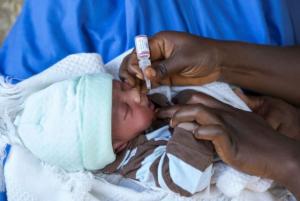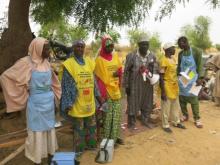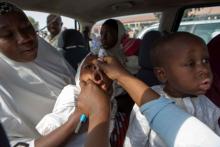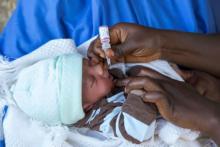Polio outbreak: Nigeria expands scope to stop further transmission
Abuja, 21 September 2016 - The scope of the second polio outbreak response (OBR) to the recently detected wild polio virus type 1 (WPV1) in Borno State has been expanded and different strategies employed to reach eligible children in Nigeria. The immunization campaign which commenced on 17 September, 2016 is targeting 31,540,054 children in 18 states across northern Nigeria.
To date, three (3) cases of wild polio virus (WPV) have been confirmed in three LGAs in Borno state, North East of Nigeria
The states involved in the second OBR include Adamawa, Bauchi, Borno, Gombe, Taraba and Yobe in the north east as well as Jigawa, Kaduna, Kano, Katsina, Kebbi, Sokoto and Zafara in the North West. In the north central, Benue, Nasarawa, Niger, Plateau and the Federal Capital Territory (FCT) are participating in the OBR.
Dr Rex Mpazanje, the acting World Health Organization (WHO) Country Representative (WR) explained that the expansion to include more states and regions in neighboring countries “is critical as the country needs to ensure that all eligible children are vaccinated within the shortest time feasible so as to limit the spread of the virus beyond the affected areas and borders of the country.
Combining inactivated and oral polio vaccines
In Borno state, the second OBR included the administration of the inactivated polio vaccine (IPV) given alongside bivalent oral polio vaccine (bOPV) in two phases. A total 1.6 million children were targeted to be reached by 3365 vaccinators and 6730 health workers.
Dr Fiona Braka, the WHO EPI Team Leader said that during the OBR, over 3000 health camps will be established in Borno; each lasting for up to six (6) days during the OBR. Nutrition screening and referral will also be offered in selected LGAs. Significantly, close collaboration with the military and Civilian JTF will continue during the campaign to explore opportunities for increasing accessibility to more settlements in security compromised areas.
Keeping international boundaries safe
As part of enhanced strategy to vaccinate children in vulnerable areas, WHO has supported Adamawa, Taraba and Yobe states in the North East Zone (NEZ) to plan and conduct international border synchronization immunization with the neighbouring countries of Cameroun and Niger. The synchronized activity involves 12 LGAs, targeting over 100,000 children.
In the North West, Katsina, Kebbi, Jigawa, Sokoto and Zamfara states also conducted synchronized vaccination in border settlements. At the end of the second day of implementation, preliminary data from the zonal office indicated that 27,653 were vaccinated in the five (5) states in synergy with vaccination teams in Niger Republic. Out of the children vaccinated, 152 received vaccination for the first time.
Guarding against importation
Concerned over the possibility of transboundary spread of the WPV from Borno, north central states of Benue, Plateau, Nassarawa and FCT in collaboration with WHO, have intensified vaccination activities along their border areas and settlements with the north east.
During the OBR, a cocktail of measures were adopted by the four (4) north central states at risk of importation to fortify their border areas and close any remaining polio immunity gaps. The four states are simultaneously implementing a series of well-coordinated synchronized border immunization activities, jointly with their north east neighbours.
In Benue, WHO is supporting intensified border immunization activities along Logo, Ukum and Katsina Ala LGAs which serve as a major transit route between the state and Taraba in the north east. As part of the strategy to ensure a high impact OBR, series of joint border synchronization events have already been implemented, and more border immunization activities are currently underway in 12 border communities. In Ukum LGA alone, 985 children were vaccinated within six scattered settlements along the border with Wukari, on the first day of the campaign.
Outside house vaccinations
Selected states conducted the directly observed polio vaccination (DOPV) strategy. In Kano, the erstwhile epicenter of WPV transmission, of the 356,623 children vaccinated through DOPV, 172,002 were from eight (8) Metropolitan LGAs
Dr Braka stated that with the DOPV strategy, children were targeted in transit areas such as markets, Motor parks and play grounds.
“The strategy essentially involves vaccinating children outside houses under the direct supervision of an independent monitor to ensure compliance. Attractive incentives such as soap and milk were provided to motivate parents to willingly submit their children for vaccination or directly attract children to the vaccination points” she added.
The second OBR which was concluded on 20 September in 16 states and FCT, is on-going in Borno until 30 September. The campaign is a synchronized activity with Niger, Cameroon and Chad.
_____________________________
Technical contact:
Dr Fiona Braka; Tel: +234 703 170 5252; Email: brakaf [at] who.int
Media contact:
Ms Charity Warigon; Tel: +234 810 221 0093; Email warigonc [at] who.int
_____________________________
Below:
01 An infant receiving OPV in Maiduguri, Borno State for the first time
02 Vaccination team targetting,eligible chilren along Nigeria and Niger border settlement in Zamfara State
03 03 Transit vaccination in Kano Motor park






